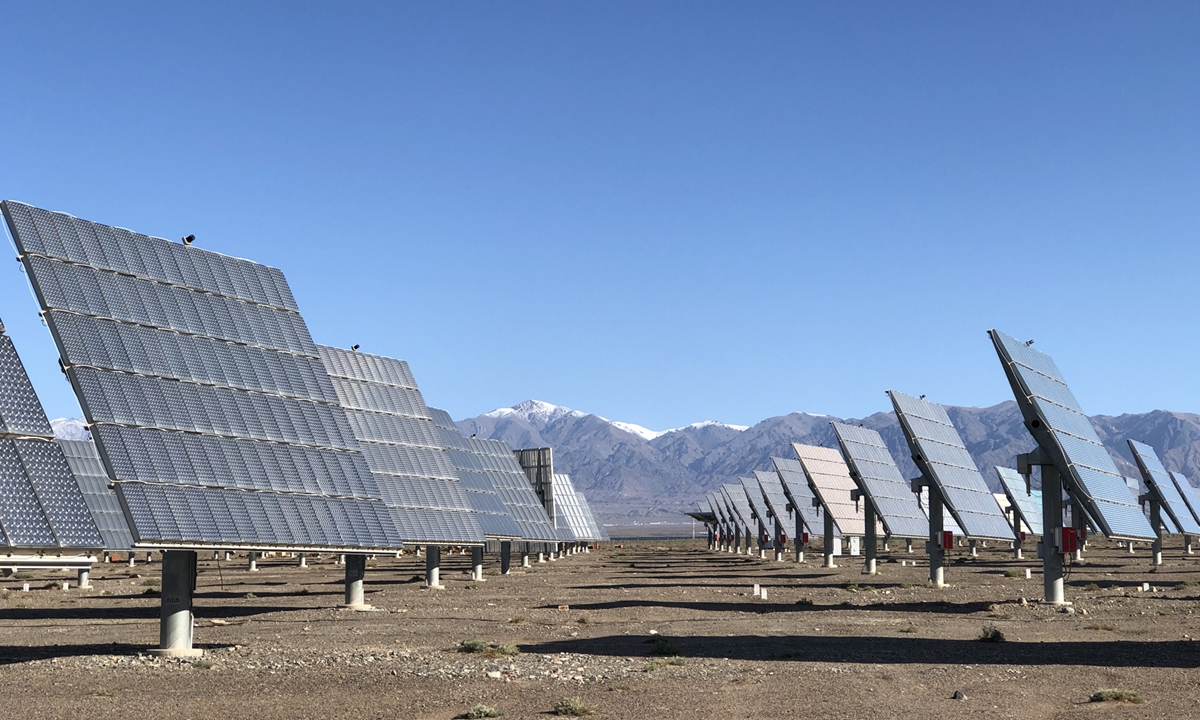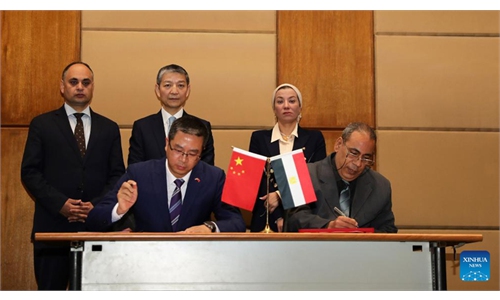
Solar panels made by a company in Xinjiang's Hami. Photo: Liu Xin/GT
It seems nothing but alarming to see the world's average temperature reach a new high for the third time in a single week, which highlights the urgency of global climate cooperation, especially among major economies. The world needs the West to take more action to benefit climate cooperation in a responsible manner and fully honor its commitments.With an astonishing surge in heat across the globe from Asia to Americas, data collected by a group of US scientists from the University of Maine shows that the global average temperature on Thursday was 17.23 C, breaking the records set on Monday and Tuesday and making it the hottest day on record.
The news of the record high temperatures comes at a time when US Treasury Secretary Janet Yellen on Saturday urged cooperation between China and the US to address climate change. "Even when the US and China have disagreements, it is vital that the two countries find ways to work together on issues of shared - and global - concern, including debt distress in low-income and emerging economies and climate finance," she said.
While cooperation between China and the US, the world's two largest emitters of greenhouse gases and the largest investors in renewable energy, may play a pivotal role in helping address climate change, whether such cooperation could be really implemented still depends on whether the US can take concrete actions to remove obstacles and improve mutual trust on climate cooperation.
The US needs to lift its sanctions on Chinese solar products. This is not a mercy to Chinese companies, but to take the responsibility for what the West has caused to global warming.
Cooperation on climate change used to be a bright spot in China-US relationship. But with bilateral relations under strain, it is uncertain whether the Biden administration could improve bilateral ties to bring new opportunities for cooperation. While some US officials claim that climate change is an issue independent of bilateral relations, it is hard to imagine cooperation to be pushed forward without the foundation of a stable China-US relationship. There is no way for Washington to pursue its strategy of containing China while achieving climate cooperation with China. Therefore, for the purpose of any meaningful results of bilateral climate cooperation, it is hoped the US will create favorable conditions for coordination and cooperation in specific areas.
Moreover, the West has been sharing a view that climate change is mainly a "China problem," concluding that they must use some political and economic means to exert pressure on China when it comes to delivering on its promises. But this is obviously a manifestation of shirking their own responsibility and arrogance.
On the one hand, China has already set forth a dual carbon national goal of reaching peak carbon emissions before 2030 and achieving carbon neutrality before 2060. Continuous efforts have been made toward the targets in such areas as developing renewable energy resources and promoting green industries. As the world leader in renewable power, China is set to double its capacity and produce 1,200 gigawatts of energy through wind and solar power by 2025, The Guardian said last month, citing a report by Global Energy Monitor.
On the other hand, the US and other developed countries, historically speaking, emitted more greenhouse gases than the developing world did. And they have failed to honor the pledge to fund the Green Climate Fund. Also, the US has imposed sanctions on Chinese photovoltaic industry over the so-called Xinjiang problem, which has not only undermined the atmosphere for green cooperation between the two countries, but also hindered the development of global renewable energy.
Actions speak louder than words. Yellen may be sincere in her desire to strengthen communication and cooperation with China in climate change, but she should probably first persuade the US government to remove the obstacles, for instance, lifting sanctions on Xinjiang's photovoltaic industry.



